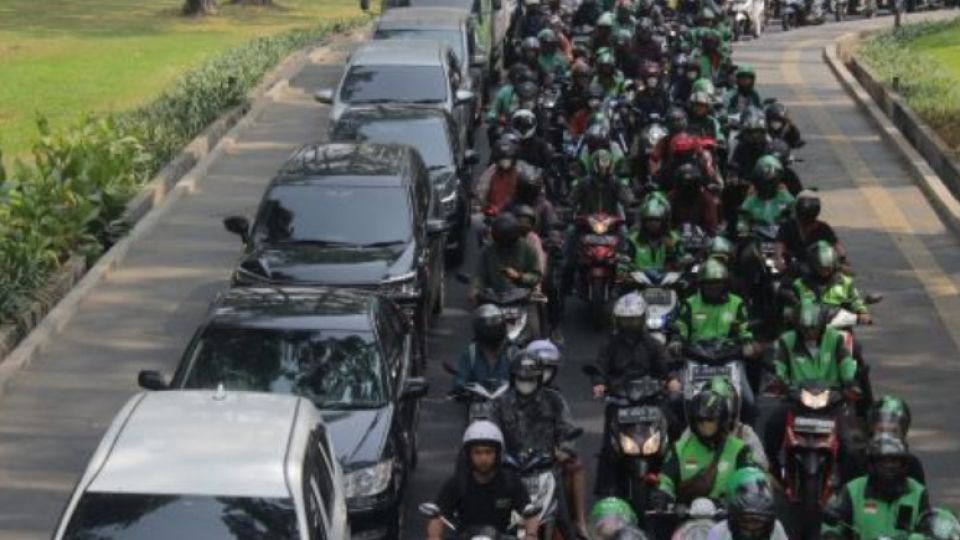May 21, 2024
JAKARTA – The Jakarta administration is making another bid to crack down on the never-ending practice of informal parking attendants at convenience stores, but the underlying cause of the city’s high unemployment rate is adding complexity to the issue.
In response to public complaints about parking fees despite the businesses providing free parking, acting Jakarta governor Heru Budi Hartono instructed relevant institutions earlier this month to discipline informal parking attendants “in a humane manner”.
Ulul, a 25-year-old private employee in Central Jakarta who uses a motorcycle, is among the residents who find the unchecked practice irksome. He said he normally spent around Rp 2,000 [13 US cents] on illicit parking fees for each visit to a convenience store.
“Actually, I feel burdened and unwilling to pay, especially when I don’t have any small change,” Ulul told The Jakarta Post on Friday.
These illegal attendants often appear just as customers are about to leave the parking lot, and don’t do much in the way of directing vehicles in a parking lot.
‘Humane’ measures
The city administration has deployed a joint team of personnel from its transportation agency, public order agency (Satpol PP), local police and the military to crack down on illegal parking attendants at convenience stores in five municipalities.
Jakarta Transportation Agency head Syafrin Liputo said on Friday that the joint team had disciplined around 127 unlicensed attendants over two days, taking down their identification data and asking them to provide a written statement saying they would not resume the illegal activity.
The collected data is to be forwarded to the Jakarta Manpower and Transmigration Agency for follow-up education and training so they can become skilled workers.
“These measures [will be implemented] using a humane and persuasive approach in the coming month,” Syafrin said, as quoted by Kompas.
A 2007 Jakarta bylaw on public order stipulates maximum sanctions of 60 days in prison and a Rp 20 million fine for individuals collecting illicit parking fees, an activity that is prohibited under the city’s public order regulation from the same year.
That regulation prohibits both individuals and entities from collecting fees for parking on the street or in public areas without a permit from the governor or relevant authorities.
Harlem Simanjuntak from the Jakarta Transportation Agency told the Post that the current crackdown would be active as long as the violations continued.
He added that the skills training program was part of the city’s measure to ensure that its workforce could be absorbed into the job market.
“[The authorities] will map out the illegal attendants’ [interests] so they can be channeled [into jobs] that suit their aspirations,” said Harlem.
“For example, if they want to be a driver, then they will be trained and get a driver’s license if they don’t have one.”
High unemployment remains a serious concern in Jakarta, and roughly 360,000 people of the 5.43 million-strong workforce were jobless as of August 2023, according to official figures.
The country’s capital has long been a magnet for urban migrants seeking better livelihoods, many of whom have little to no skills and low education, which has only contributed to widespread unemployment.
Real solution?
Public policy expert Trubus Rahadiansyah from Trisakti University expressed doubt that the city’s latest measures would truly end the perennial problem of illegal parking attendants.
“The current solution is still sporadic and only for the short term. Later, [illegal parking attendants] will definitely return again,” he told The Jakarta Post on Friday.
Instead of disciplining them or offering skills training, Trubus called on the authorities to recruit them as formal employees with monthly wages.
“I think parking facilities at mini-markets should still be free, but [their management] could be the responsibility of Jakarta administration,” he continued.
Trubus added that among the reasons for the administration’s failure was that informal parking attendants apparently shared their profits with local authorities, such as the heads of neighborhood units (RT) and community units (RW).
Acting governor Heru admitted that he had received reports from the transportation agency about unscrupulous RT heads receiving illicit payments from informal parking attendants.
He said a mechanism was in place under which “subdistrict heads will summon their RT or RW heads and give them a warning or sanction”, Antara reported.
“RT heads [must] follow the city’s regulations. If not, they can be replaced,” he stressed.


